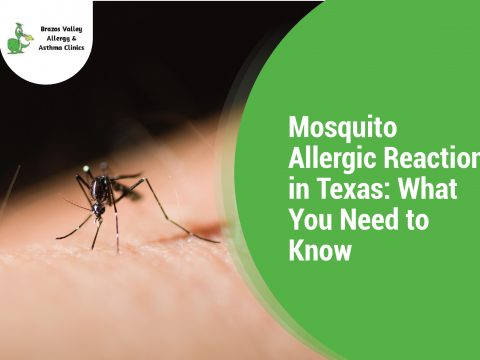- 979-485-9287
- office@bvallergy.com
-
 979-251-7804
979-251-7804
Can You Outgrow an Allergy?

Top 5 Common Allergies in Children
November 9, 2022
How to Manage Fall Allergies
November 30, 2022Allergies are common worldwide. It can affect anyone without warning, including children and adults. Therefore, we must learn to accept it as a part of our lives. Some individuals “outgrow” allergies without medical intervention. On the other hand, others fight allergies into adulthood.
Studies say people without allergies can still develop this adverse health condition later in life. So, is there such a thing as “outgrowing an allergy?”
The answer is yes.
This article will answer the question: Can you grow out of allergies? Our goal is to provide you with factual information about allergies. We’ll cover its definition, common signs and symptoms, and treatments. What’s more, we’ll explain how individuals outgrow their allergies.
So, without further delay, let’s begin our conversation.
What is an Allergy?
An allergy occurs when your immune system begins to attack harmless proteins. When your immune system tries to eliminate regular proteins, you experience an allergic reaction. It is due to the excessive production of histamines in your body. This principle applies to seasonal, perennial, and food allergies.
Common Signs and Symptoms
The common signs and symptoms of allergies vary but have similar effects. Children and adults may experience a wide range of symptoms, from mild to moderate and sometimes severe. We’ve compiled the most common symptoms of allergies to provide you with better insight regarding the matter. Here’s our list:
- Hives
- Cold-like symptoms
- Swelling
- Respiratory difficulties
- Digestive problems
- Skin rashes
These symptoms can occur within minutes of consumption or exposure. In most cases, they are mild to moderate and often don’t require medical interventions. On the contrary, a severe allergic reaction might lead to a life-threatening situation. One example is anaphylaxis.
Anaphylaxis
A person experiencing anaphylaxis is in critical danger. This life-threatening allergic reaction requires medical attention as soon as possible. Here are the signs and symptoms of anaphylaxis:
- A weak, rapid pulse
- Clammy or pale skin
- Vomiting
- Breathing difficulties
- Nausea
- Difficulty swallowing
- Wheezing
- Hives
- Diarrhea
- Fainting spells
- Dizziness or lightheadedness
These symptoms can occur immediately or within hours of accidental exposure or consumption. It is best to call 911 or go to the emergency room in situations like this. The severe allergic reaction could lead to a sudden drop in blood pressure, worsening the problem.
When Do Allergies Emerge?
You can develop allergies at any time. Many individuals with allergies develop them when they’re young. But some individuals suddenly experience allergy symptoms when they’re older.
Allergies in Children and Adults
Children are most likely to develop food allergies. Several factors contribute to this adverse medical condition. Here are some examples:
- Cow’s milk
- Soy
- Peanuts
- Fish
- Tree Nuts
- Wheat
- Pet dander
Adults who do not have allergies before may also develop them. Aside from the list above, here are the other factors:
- Seasonal allergies
- Perennial allergies
- Pollution
- Pet dander
As you grow older, extended exposure to these factors is why you develop an allergic reaction. Can you grow out of seasonal allergies? Yes, you can. But they are more likely to return during the allergy season.
Treatment and Management
Can allergies suddenly disappear? Yes. But some require medication. The typical allergy treatment includes
- Medication
- Allergy shots
- Avoidance
- Epinephrine (for anaphylaxis)
The treatment approach depends on your personal needs or the severity of your allergic reaction.
Can You Outgrow Allergies?
Do allergies ever go away? Yes. Outgrowing means, allergies go away naturally as you grow older. There is evidence that children or adults outgrow their allergies. Below are the documented facts.
Studies say that approximately 60-80 percent of children outgrow their allergies to milk and eggs upon turning 16. Moreover, roughly around 20 percent outgrow peanut allergies. Finally, about 4-5 percent outgrow their allergies to fish or shellfish.
Researchers also reported that children allergic to soy, milk, and eggs, outgrow their allergies faster. In addition, children who develop allergies early are more likely to outgrow them.
Children outgrow allergies naturally. But there are other methods to outgrow allergies with medical intervention. These options are called oral immunotherapy and allergy shots.
Oral Immunotherapy
Oral immunotherapy, or OIT. This process gradually desensitizes your body of food allergens. It helps reduce the symptoms of accidental exposure or consumption. Your allergist will continue to provide this treatment until your body adjusts to allergens accordingly.
Allergy Shots
As the name suggests, this treatment is similar to OIT but performed via IV. The treatment typically lasts 3-5 years, depending on the case. Your allergy doctor will continue the treatment until your body reaches a point where allergy symptoms are reduced.
Note: Can you outgrow asthma or allergy-induced asthma? Unfortunately, the answer is no. However, it is manageable.
Helpful Tips
If you think you’ve already outgrown your allergy, the next step is to find ways to make sure. Here are some tips you can try:
Talk to Your Allergist
Doctors can offer allergy testing to verify if you have already outgrown your allergy. Moreover, they can provide you with the appropriate plan to confirm if it’s true.
Keep Your Anti-Allergy Meds Handy
Try to keep an ample amount of anti-allergy medications at home to be on the safe side. In addition, always bring them whenever you plan to travel or eat out.
Be Vigilant at All Times
No allergic reactions don’t mean you’re free of allergies. Never stop monitoring yourself to avoid risks and complications.
Why Choose Allergists is Brazos Valley Allergy and Asthma Clinics
You should never take allergies lightly. Contact Brazos Valley Allergy and Asthma Clinics today to ensure you are protected.
Dr. Paul Jantzi is a board-certified allergist specializing in treating and managing allergies. He uses evidence-based methods based on years of experience, such as immunotherapy.
Book an appointment today if you want fast scheduling and top-notch treatment based on your personal needs. Click this link to proceed with your appointment schedule.
You can also choose your preferred clinic location by clicking here.




